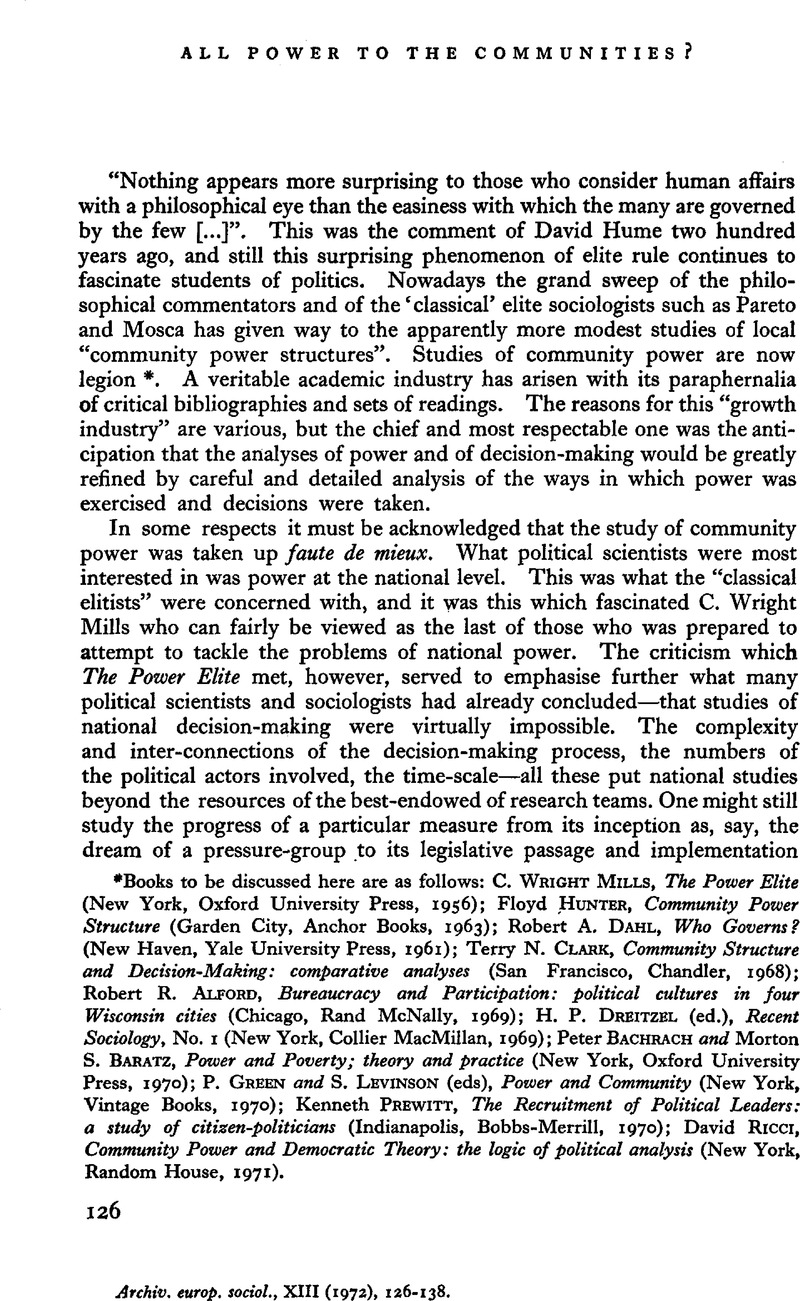Published online by Cambridge University Press: 28 July 2009

* Books to be discussed here are as follows: Mills, C. Wright, The Power Elite (New York, Oxford University Press, 1956)Google Scholar;Hunter, Floyd, Community Power Structure (Garden City, Anchor Books, 1963)Google Scholar;Dahl, Robert A., Who Governs? (New Haven, Yale University Press, 1961)Google Scholar;Clark, Terry N., Community Structure and Decision-Making: comparative analyses (San Francisco, Chandler, 1968)Google Scholar;Alford, Robert R., Bureaucracy and Participation: political cultures in four Wisconsin cities (Chicago, Rand McNally, 1969)Google Scholar;Dreitzel, H. P. (ed.), Recent Sociology, No. 1 (New York, Collier MacMillan, 1969)Google Scholar;Bachrach, Peter and Baratz, Morton S., Power and Poverty; theory and practice (New York, Oxford University Press, 1970)Google Scholar;Green, P. and Levinson, S. (eds), Power and Community (New York, Vintage Books, 1970)Google Scholar;Prewitt, Kenneth, The Recruitment of Political Leaders: a study of citizen-politicians (Indianapolis, Bobbs-Merrill, 1970)Google Scholar;Ricci, David, Community Power and Democratic Theory: the logic of political analysis (New York, Random House, 1971)Google Scholar.
(1) Reprinted in Bachrach and Baratz, op. cit. For the books cited in this paragraph, see note.
(2) Bachrach, and Baratz, , op. cit. p. 43Google Scholar.
(3) Alford, , op. cit. p. 194Google Scholar.
(4) See the discussion in the present writer's Political Elites (London, Allen and Unwin, 1969)Google Scholar.
(5) Alford, , op. cit. p. 194Google Scholar.
(6) Bachrach, and Baratz, , op. cit. p. 49Google Scholar.
(7) Bachrach, and Baratz, , op. cit. p. 203Google Scholar.
(8) Further on for these distinctions and their related modes of participation see articles in Parry, Geraint (ed.) Participation in Politics (Manchester University PressGoogle Scholar, forthcoming).
(9) E. g. the articles in Green and Levinson, Dreitzel, Ricci, all cited in note.
(10) The Dreitzel collection is almost entirely critical — at which level one should single out the piece by Todd Gitlin on “Local Pluralism as Theory and Ideology” which must have been one of the earliest of the now fashionable critiques of pluralism.
(11) Dahl, Robert, After the Revolution? (New Haven, Yale University Press, 1970), p. 68Google Scholar.